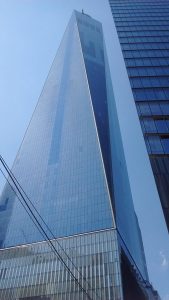This Week’s Bit of String: ‘I think something might be happening…’
On a sunny New England morning, my mother drove me to my 39-week hospital visit. We were running late for the 9:00 appointment, because I’d been in labour for more than thirty hours, and that rather interfered with my sleep. So she dropped me off at the entrance and I ran (okay, stumbled) upstairs while she went to park.
The male gynaecologist smiled patiently but didn’t bother examining me, I guess because I wasn’t screaming in agony. I was in and out quite quickly, silently miserable despite my lack of screams.
As she accompanied me back to the car park under perfect blue skies, my mother said cautiously, ‘I think something might be happening.’
Damn straight, I thought. Surely my insides squeezing like a toothpaste tube every five to seven minutes for this long is producing some result.
But there was in fact something much bigger happening. As she came up to meet me, she passed workmen listening to the radio. At home we put the TV on instantly, and I watched Dan Rather’s shock as the World Trade Center started collapsing. I remember his words while I vainly attempted to smother the pain with heating pads: ‘May God have mercy on their souls.’

Exactly fourteen hours after the first plane hit the first Tower, my son was born. I didn’t know anyone who was killed that day. Although I lived in the same corner of the country, I’d barely visited New York City. But bringing a new life into the world that day, under my own very uncertain circumstances, threaded a deep connection within me to the events.
Just as motherhood changed how I write, the terrorist attacks changed how the country wrote. Have you noticed that?
Characteristics
Questioning became literature’s emergent theme, a certain shaken quality to the characters of post-9/11 stories. Main characters have power and talent, but there’s uncertainty that this will be enough, in a world where sunny mornings can end in flame and toxic smoke, where going to work at one of the world’s most famous addresses can result in death.
This prompts a re-exploration of life’s meaning, and an increased tendency for characters to admit their lack of fulfillment. Almost like a survivors’ guilt, not reconciling with victims of the attacks, but trying to reconcile with the circumstances outside our fortunate nation that were causes of, and exacerbated by, the tragedy.
Writers tend to be fairly liberal people, so many were aware of the situations further abroad that may have motivated young radicals to sign on to Al Qaeda’s cause. They would also have noticed the effects of our sometimes heavy-handed response. While this hasn’t resulted in many cases of outright literary rebuke, it often shows in the characters’ actions and thought processes.
And yet the storylines rarely take power from the powerful. Characters find ways to redeem themselves at least in their own eyes without sacrificing too much comfort. This is realistic, perhaps, but also revealing. How much do those of us who are somewhat privileged really want equality?
Examples
First, there are still books dealing with the immediate aftermath which I haven’t read. A fuller list of work dealing with the tragedy is here in The Guardian. My comments are inevitably coloured by other recent reads: Jonathan Franzen’s Freedom, even Kathryn Spencer’s The Help. Things get shaken up, but the balance of power remains.
Also, spoilers.

Jennifer Egan’s worthy Pulitzer winner A Visit from the Goon Squad deals with grown-ups, several of them rich music industry figures, growing up again and again. I read this after rereading The Great Gatsby, and was struck by the similar portrayal of roiling anxiety beneath decadence. The characters mention the skyline gap left by the Twin Towers, but principally I see this work as thematically relevant; the feeling the world is ending and maybe we deserve it, maybe we even want to see how it unfolds, but the ones at the top will find a way to survive.
Saturday by Ian McEwan is set across the Atlantic, in the other half of the ‘Special Relationship,’ amidst massive protests against the start of the Iraq War. Both the UK and the story’s protagonist, a well-off surgeon, are forced to question whether they are truly righteous. The main character’s careless traffic violation wreaks havoc in his life, but without major consequences that last beyond the single day in the book. He will be more careful in future, no doubt, and we are glad he’s all right, because he loves his family and tries to do good. But I wish there could have been a happy ending for the poor, chronically ill man he collided with, too.
In The Reluctant Fundamentalist, Mohsin Hamid adds vital perspective by imagining the adventures of a Pakistani Muslim man in America during 9/11. The questioning and the power take on different angles here, because although the main character has talent and some privilege at least in his native country, the real power here is the US, and it seems to have sided against him. The nation may have suffered, but it’s not going to do it quietly. This man has been forced to question whether all he wanted—success in New York City—ever wanted him back.
Finally, of course I must mention Jonathan Safran Foer’s Extremely Loud and Incredibly Close. It links young Oskar’s grief after his father’s death in the World Trade Center to his grandparents’ continuing trauma after the fire-bombing of Dresden. Then it widens the net as Oskar searches New York City for answers, and meets all sorts of people who seem to be searching in their own way. I find this to be a gloriously human book, and as it’s set in the more immediate aftermath of the events, it’s more about survival and redemption than power.
What themes stand out to you post 9/11? What other books offer important perspectives on the event?